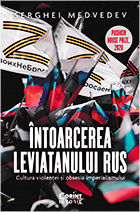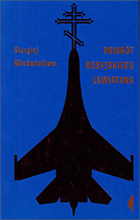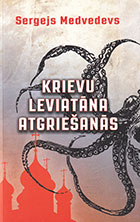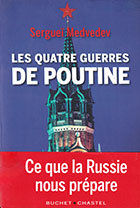Sergei Medvedev
The Return of the Russian Leviathan
Proposal
Published by
- individuum, Russia (under the title „Park Krimskogo perioda“)
- Polity Press, United Kingdom
- Pistorius & Olsanska, Czech Republic
- Corint, Romania
- Czarne, Poland
- Libella, France
- Argo Publishers, Estonia
- Küre Publishing House, Turkey
- Relógio D’Água Editores, Portugal
- Jumava, Latvia
„While there are many books about President Vladimir Putin’s Russia, there are few that nail its realities with the same combination of academic precision, acerbic wit and anger as this. Well-researched analysis might be expected of a professor of Moscow’s Higher School of Economics, but not necessarily the humour and passion that run through the striking work. At his best Medvedev echoes Nikolai Gogol, the 19th-century satirist of Tsarist Russia.“ (Financial Times)
„As he is himself Russian, Medvedev, a social scientist, feels gloriously free to be extremely rude about his homeland and compatriots. In the vein of the nineteenth-century satirists Nikolai Gogol and Mikhail Saltykov-Shchedrin, Medvedev has an unerring eye for the grotesque. Among the absurdities of modern Russian life that he identifies are the theology department of the National Research Nuclear University and the blessing of space rockets by Orthodox priests. Medvedev’s portrait of Russia is brilliant, wry and minutely observed – and, like its title, often bitterly ironic.“ (Times Literary Supplement)
“Russia nowadays relies heavily on the tradition of tsarist autocracy with its roots going back 600 years to the time of the emergence of the Muscovite state as the heir of the Golden Horde. As a historian, I found it very exciting to observe the process: I witnessed the comeback of the traditional forms of governance and subjugation, methods of totalitarian thinking and soviet figures of speech, practices of state distribution and the rituals of hereditary social groups echoing both Brezhnev’s era and Stalinism, on one hand, and serfdom and the time of Ivan the Terrible, on the other. Russia’s history seemed to repeat itself, re-enacting most of the social, political, and economic matrices, and Russia appeared to be sliding back onto the same historical track trodden for centuries.
Undoubtedly, Vladimir Putin is the herald and embodiment of return to a nation state. It would be wrong, however, to link the state’s return exclusively to Putin. More likely, he has become a designated figure embodying and marking a mammoth historical cycle of the eternal return of the Russian Leviathan. It is not Putin resurrecting the traditional models of Russian history. On the contrary, it is the history of Russia itself materialized in the figure of Putin who, quoting the sharp observation of author Victor Pelevin, became Russia’s national idea.
This book seeks to fathom the origin and formation of this regime. Is it a logical continuation of post-Soviet transition, or is it a plot twist introduced through the will of one man? Is it a purely Russian invention or a Russian version of a global trend seeking to de-globalize and return to the nation state model with its old grudges and unaccomplished ambitions, as illustrated by the Brexit and Donald Trump’s election as US President?” (Sergei Medvedev, from the preface of the book)
“Night has fallen again in Russia, with bonfires of the vanities burning and witchcraft invoking the ghosts of forgotten ancestors. Sergey Medvedev, in a series of brilliant essays, chronicles the society’s dehumanization, and its immersion into myth” (Vladimir Mirzoev, theater and film director).
The social scientist and journalist Sergei Medvedev takes us on a journey through Russia with his history and all its contradictions, with his prejudices and absurdities, he explains much that seemed inexplicable to us so far, and presents this unusual portrait of his homeland with a light hand and a lot of humour.
The book consists of four parts, each describing one of the wars waged by the state.
- The war for territory
From the war for Moscow’s squares and boulevards between the authorities and the protest movement to symbolic acts of the Kremlin aimed at collecting Russian land, such as plans to colonize the Arctic; from the post-imperial gamble in the Crimea and Donbas to the neocolonial war in Syria. Here, among others, the following questions are being asked: – Why is the history of Russia all about the state’s fight against its people? While other countries used to colonize overseas territories, Moscow colonizes the whole country, the state has colonized the nation, the people.
– Why is fear, not oil or gas, Russia’s key export in the 21st century?
– Why has the invention of “Ukrainian fascism” has proved to be such a triumph for Russian political technologists who, within just a few years, managed to transplant almost the entire population into the TV set, a never-ending soap opera, parallel reality, in which fascists march through Kiev, Ukrainians down a Malaysian Boeing, and the West sponsors Maidan, planning to accept Ukraine into NATO and to station the US 6th Fleet’s ships in the Black Sea?
– Why does Russia opt to intensify global problems—refusing to accept and accommodate refugees and herding them to Western Europe through passages over the borders with Finland and Norway, and using them as hybrid warfare tools to exacerbate Europe’s migration crisis and provoke anti-immigrant sentiments?
– How does tabooing all talks of Russia’s territorial format expose the ancestral trauma of Russia’s political elite—phantom pain after the collapse of the Soviet Union, “the greatest geopolitical disaster of the 20th century”, according to Vladimir Putin—and panic and fear in the face of the threat of further disintegration?
– Why Russian politicians, like little children, guilelessly believe that declaring Nikita Khrushchev a public enemy, who took Crimea from Russia and handed it to Ukraine in 1954, and rewriting the Decree of the Supreme Council, is a sure way to russify Crimea and have it recognized by the international community.
– And what will happen to Alaska? After all, Putin’s Federal Council has already voted in favor of the abolition of the 1867 Alaska Purchase Treaty.
- The war for symbols The struggle for symbolic dominance through different locations, signs, rituals, and demonstrations of power, with the Kremlin and the Red Square as sacred spaces, military parades and patriotic parks as sanctuaries of sovereignty. One of the major symbols of power are strategic nuclear missiles paraded through the streets of Moscow, painted on popular t-shirts, intimidating the West from giant monitors during Putin’s campaign speech in March 2018, and thus forming the symbolic foundation of new Russian self-awareness.
– Why, for 18 years from 1990 to 2008, did Russia live without parading its military equipment through the capital and yet, three months after the first Victory Day parade with Putin at the helm, Russian tanks rolled up and down South Ossetia during the war with Georgia, holding the first military operation outside the country in years?
– Is it not a symptom of schizophrenia when the authorities, isolated from the people by the serrated Kremlin walls, alien to and even embarrassed of the people, fancy themselves as Russian patriots, strangely enough?
– Why are not the Russian people appalled at the corruption and in-your-face luxury of the political and business elites, with Putin’s palaces and Patriarch Kirill’s 30,000 USD Breguet luxury watch, business jets flying former First Deputy Prime Minister Shuvalov’s dogs, and lions in the private zoo run by Chechnya’s leader Ramzan Kadyrov?
-Why are astrological forecasts in Russia published next to exchange rates, or priests bless spacecraft, and astrologists monitor pregnancy instead of gynecologists, and why one finds icons over the dashboard in every other car while the seatbelts are permanently unbuckled?
- The war for the body A new area of state regulation revealed with special clarity in the 2010s, meaning the practice identified by Michel Foucault as biopolitics, that is, the state’s intrusion into citizens’ privacy, their consumer, sexual, and reproductive practices. Here we may call to mind the fight against gay propaganda and foreign adoption, religious indoctrination in school, and the destruction of foreign-made food products subjected to Russian sanctions. Power intrudes upon places previously considered private, such as our guestrooms, bedrooms, and kitchens, and noses around in private refrigerators, strictly regulating the bodily life of the Russian citizens on the pretext of a struggle for demography and the introduction of Russia’s sexual sovereignty, as it were.
– Why the state tells Russian citizens what to eat, what kind of sex to have, and how many children to have—one of the first decrees issued by Putin on the day of his inauguration in May 2012 was one on measures for the implementation of the demographic policy of the Russian Federation, in which the government was instructed “to up the total fertility rate to 1,753 by 2018.” As the best way to fight against AIDS, social advertising offers abstinence and faithfulness in marriage. And why is the size of Russia’s population more important to its rulers than the quality of their life?
– Why is it that Moscow—which has been a melting pot of waves of peoples, races, and religions—has now become a hotspot of primitive racism that constantly produces its own miserable rejects: the elderly, homeless, junkies, and AIDS-stricken? Migrant workers are simply treated as human resources, and all it takes is agreeing on their quantity, terms of use, and measures of social and cultural hygiene.
– How can the hysterical reaction to female flash mob “I am not afraid to speak”—when Russian women, for the first time in their lives, started to speak up about their experience of sexual violence and humiliation—be explained? According to official (read understated) statistics, forty women die from physical abuse in Russia every day. And now domestic violence has been decriminalized altogether. According to the new law adopted by the State Duma in 2017, thanks to its women delegates, the first offense of physical abuse by family members is not considered a felony. People in Russia are incapable of discussing the problems of cancer, AIDS, disability in public space, and the topic of homosexuality has also been further tabooed and repressed since the adoption of homophobic laws.
– Why, similar to Stalin’s era, “watchful citizens” keep dialing hotline numbers to report stores carrying goods banned through Russian sanctions? Why do TV stations broadcast the destruction of cheese in mobile cremation furnaces? And why do sanitary authorities explain on end how harmful Western cheeses are for Russian stomachs?
-And how has the glamorization of Putin’s body come to be, expanding to national dimensions, entering every household, greeting Russian citizens from T-shirts and the covers of exercise books, and leading the Presidential Administration’s Deputy Chief of Staff Vyacheslav Volodin to a logical conclusion: “With Putin, there is Russia; without Putin, there is no Russia”?
- The war for memory This includes the state’s active historical and memorial policy, from publishing a unified history school textbook to the cult of Victory Day, May 9th, from Stalin’s rehabilitation to tackling the falsification of history. The state, after giving up the idea of building a future, is sustained by dreams of the heroic past, composing a mythical history of Russia as a continuous succession of victories, and while dreading to admit failures and mistakes, suppresses traumatic memories.
– Why has Russia’s public space transformed into a hotbed of hatred and mutual accusations? You mourned the victims in Paris, but not the Russians in Sinai—you must be a Russophobe. You sympathized with the victims aboard the MN17 flight but not the miners in Donbass—well, you are a traitor. You take care of stray dogs but not little children—that makes you a misanthrope. You plant trees while neglecting human beings—ecofascist is what you are.
– Why has history in Russia turned into a maiden to the authorities, yet another resource at the state’s disposal, along with grain, fur, oil, and the acquiescent population? Russia is a country with an unpredictable past, they say. People, generation after generation, believe in the rituals of rewriting as they do in primal magic. In the same vein, schoolchildren in Stalin’s era would strike out from their textbooks the names and cut out the pictures of politicians and generals who turned out to be “enemies of the state”.
– Why are people in Russia incapable of talking about traumas like the legacy of Stalinist repressions or contemporary history, such as Afghanistan or Chernobyl, or the shifts in the 1990s?
– Why has May 9, the most significant date in Russian history, turned into a mammoth fraud? Fake veterans with phony decorations prance down the streets, and many are veterans of the NKVD/KGB, not the war, and the average age of the “veterans” invited to Moscow from all corners of Russia to celebrate the 70th Victory Day is… 73 years! Bogus posters look down from the walls and billboards, with largely illiterate illustrators drawing Victory Day slogans to database pictures featuring American soldiers, Israeli tanks, and even Luftwaffe pilots.
– How much lower can the Russian judiciary stoop after having relied on the canons of the 4th and 7th centuries church councils in its verdict on the case of the Pussy Riot art group performing a punk-style church service in the Cathedral of Christ the Savior?
– Why does the victory in World War II create an illusion of the nation’s grandeur in Putin’s Russia, while the rear window stickers on thousands of cars throughout the country feature the hammer raping the swastika and an inscription that reads, “1941-1945: We can do it again”?
– Is it not the same, though in different wording, what author Victor Pelevin says, “The cosmic purpose of Russian civilization is to transform solar energy into people’s misery”? Is it not the source of famed melancholy, boundless Russian singing, and endless Russian binge drinking?
– Is acclaimed American Slavic scholar Daniel Rancour-Laferriere right when he says that “moral masochism and the cult of suffering,” longing for being humiliated and insulted, permeate Russian culture?
“Should Putin’s post-Crimea Russia be feared? Hegel teaches that history repeats itself, the first time as tragedy, then as farce. With all the tragedy inflicted by the regime’s individual crimes, the Russian Empire has entered its final, imitative phase of its history. The book talks a lot about fake news, simulacra, and historical reconstruction. The new Russian quest for sovereignty may sometimes be deadly but, on the whole, this is already phantom pain, the wars of a fatigued empire that has outlived its era, exhausting its repository of resources and continuing rearguard battles on its rapidly shrinking territory. Observing these battles is sometimes frightening, sometimes educational, but most frequently it is ridiculous. This book is written where historical intuition and comical intonation meet.” (from the preface)
Reviews:




